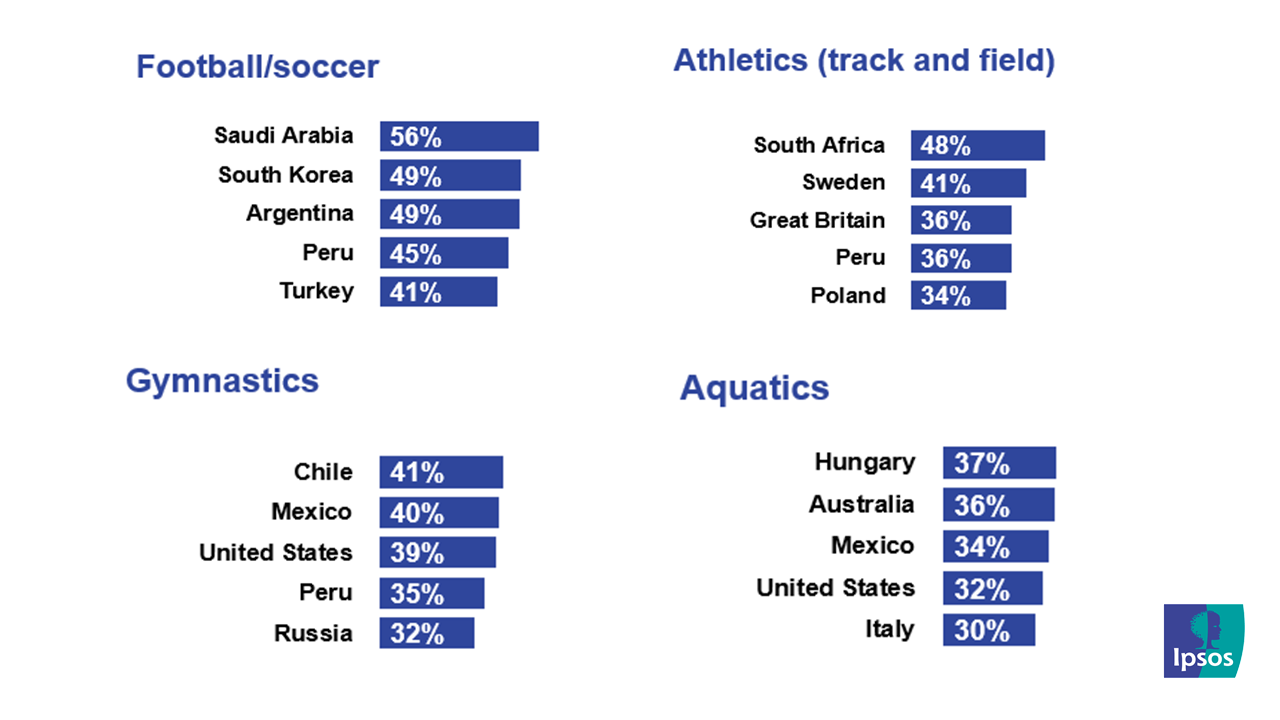From highs to lows: interest in the Tokyo Olympics varies around the globe
With the approach of the postponed 2020 Tokyo Summer Olympics, due to begin on 23rd July 2021, we asked people in 28 countries their views on the event: Should it go ahead? How interested are they personally? What is the impact of the Games on wider society?
Key findings:
- Uncertainty about whether the Olympics should go ahead: People are divided on this point, due to the continued impact of Covid-19. On average across 28 countries, 43% agree it should go ahead while 57% disagree. Support is significantly lower in host nation Japan (22% agree vs. 78% disagree).
- The uniting power of the Olympics: 62% on average say the event marks an important opportunity for the world to come together. A similar proportion (65%) say that the Olympics bring their country together.
- Levels of interest vary across the world: India, South Africa and China are most interested in the Toyko Olympics while Belgium, South Korea and Japan are least.
- Football/soccer is the most popular Olympic event: In terms of public interest, Athletics is second, followed by Aquatics in third and Gymnastics in fourth.
- Inspiration and participation: Around the world, an average of eight in 10 say the Olympics inspire younger generations to participate in sport.
Support for Tokyo 2020
Overall, support for the Olympics taking place in summer 2021 is muted, due in part to concerns over Covid-19. On average across the 28 countries surveyed, 43% say the event should go ahead, compared to 57% who say it shouldn’t.
There is greatest support for the Olympics taking place as scheduled in Turkey (71%), Saudi Arabia (66%), Russia (61%) and Poland (60%). However, those in host nation Japan are among the most doubtful: 22% say the Olympics should go ahead while 78% say it shouldn’t.
The uniting power of the Olympics
However, 62% worldwide agree that the Olympics will be an important opportunity for the world to come together following the pandemic. Turkey and Saudi Arabia once again show the highest levels of agreement with this statement (81% in both). South Korea, Japan and Germany are the only countries where fewer than 50% say that the Olympics presents this opportunity to come together.
We also find there is widespread agreement among the public that the Olympics (generally speaking) brings their country together. Two-thirds (65%) agree with this statement, rising to 92% in China and 84% in India. But this falls to 36% in Japan and 37% in Germany.
Levels of interest - overall
There is a mixed picture when it comes to interest in the Olympics, as majorities in 13 of the 28 countries surveyed say they are very/somewhat interested, but majorities in 15 countries report being not very/not at all interested.
Engagement appears to be higher in India, South Africa and China, but lower in Belgium, South Korea and Japan.

Levels of interest - events
Looking across the various Olympics events, we find that most people are interested in following football/soccer, followed by athletics/track & field, aquatics (swimming, diving, synchronized swimming and water polo), then gymnastics.
Q: From this list of Olympic events, which three are you most interested in following this year?
Top 5 (global country average):
- Football/soccer (30%)
- Athletics/Track & field (27%)
- Aquatics* (22%)
- Gymnastics (21%)
*swimming, diving, synchronized swimming and water poloCompleting the top 10 are volleyball, tennis, basketball, cycling, boxing, and badminton.
For each of the top four sports, the five most interested countries (measured by the % that place it in their top 3 from a list of 21 sports) are:

Impact of the Olympics on society
We also asked people what they think of the Olympics in a wider sense. Some highlights include:
- A majority worldwide (80%, global country average) say that the Olympics inspire younger generations to participate in sport.
- Two-thirds (67%, global country average) approval of government funding being used to support the performance of their country’s Olympic athletes.
- Seven in 10 (71%, global country average) agree that Olympic athletes should be given priority Covid-19 vaccinations. Agreement is high in China (92%), Saudi Arabia (89%), India (88%) and Turkey (87%) but less decisive in Germany (50%), Great Britain (52%), Belgium (54%) and the Netherlands (56%).
- Opinion is split regarding whether there is too much nationalism on display at the Olympics (55% agree and 45% disagree, according to our global country average).
Methodology
These are the results of a 28-market survey conducted by Ipsos on its Global Advisor online platform. Ipsos interviewed a total of 19,510 adults aged 18-74 in the United States, Canada, Malaysia, South Africa, and Turkey, and 16- 74 in 23 other markets between 21st May and 4th June, 2021.
The sample consists of approximately 1,000 individuals in each of Australia, Belgium, Brazil, Canada, mainland China, France, Germany, Great Britain, Italy, Japan, Spain, and the U.S., and 500 individuals in each of Argentina, Chile, Colombia, Hungary, India, Malaysia, Mexico, the Netherlands, Peru, Poland, Russia, Saudi Arabia, South Africa, South Korea, Sweden, and Turkey.
The samples in Argentina, Australia, Belgium, Canada, France, Germany, Great Britain, Hungary, Italy, Japan, the Netherlands, Poland, South Korea, Spain, Sweden, and the U.S. can be taken as representative of their general adult population under the age of 75.
The samples in Brazil, mainland China, Chile, Colombia, India, Malaysia, Mexico, Peru, Russia, Saudi Arabia, South Africa and Turkey are more urban, more educated, and/or more affluent than the general population. The survey results for these countries should be viewed as reflecting the views of the more “connected” segment of their population.
The data is weighted so that each market’s sample composition best reflects the demographic profile of the adult population according to the most recent census data.
“The Global Country Average” reflects the average result for all the countries and markets where the survey was conducted. It has not been adjusted to the population size of each country or market and is not intended to suggest a total result.
Where results do not sum to 100 or the ‘difference’ appears to be +/-1 more/less than the actual, this may be due to rounding, multiple responses or the exclusion of “don't know” or not stated responses.
The precision of Ipsos online polls are calculated using a credibility interval with a poll of 1,000 accurate to +/- 3.5 percentage points and of 500 accurate to +/- 5.0 percentage points. For more information on the Ipsos use of credibility intervals, please visit the Ipsos website. The publication of these findings abides by local rules and regulations.
